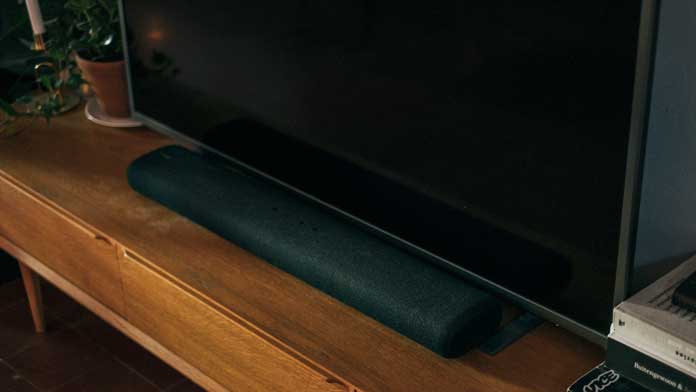Soundbars are a valuable piece of equipment to have as part of your home entertainment system. When buying a new soundbar, a common concern is the effect they might have on your TV, hard drive, or sound quality if they lack magnetic shielding.
Most soundbars are not magnetically shielded because modern LCD, OLED, and plasma TV images are not affected by magnetic waves. Magnetic shielding on speakers was useful during the era of Cathode Ray Tube (CRT) TVs since placing an unshielded speaker close to a CRT TV causes all kinds of color distortions and interference.
Magnetic shielding and the sound quality of soundbars
Magnetic shielding has no effect on the sound quality of soundbars/speakers because the magnetic fields in speakers are usually focused around the voice coils. Also, unlike CRT TVs, speakers are less sensitive to external magnetic fields. This means adding a magnetic field will have little to no effect on the operation of the speaker.
Can soundbars damage a TV?
With the exception of CRT TVs, where soundbars could cause magnetic interference that leads to distorted images when placed close to the screen, sound bars can not damage modern LCD/LED, plasma, or OLED TVs. This is because modern TVs do not produce images using an electron beam driven by magnetic fields.
Do speaker magnets affect LED TVs?
Speaker magnets affecting LED TVs is a common question among TV owners. This is especially worrisome if you are short on space and have to put your speaker very close to your TV.
LED TVs are not affected by speaker magnets because they produce images using Light Emitting Diodes (LEDs) and a Liquid Crystal Display (LCD) Panel, instead of electron beams guided by magnetic fields. The LEDs provide a uniform light source while the LCD panel controls where the light should be distributed as per the input signal.
Soundbars affect on Wi-Fi
Soundbars can affect your Wi-Fi signal, especially if they are operating in the same or almost similar frequency range as the router. The frequency signal from the soundbar can sometimes be strong enough to overpower that of the router, thus causing Wi-Fi signal interference which leads to disrupted connections or slow internet speeds.
You can prevent soundbars from affecting your Wi-Fi by changing the operating signal of your router or that of the soundbar so that they work at different frequency ranges. You can also set the frequency channel of your router to automatic (if your router has this feature) and the router will automatically find the least noisy channel.
Also, if your router and soundbar are placed very close to each other, you can try putting them farther apart and see if this solves your Wi-Fi problem. You could also run a physical cable from the soundbar to the connecting devices and do away with the wireless connection if it’s causing issues.
How close a soundbar should be to a TV

Since modern TVs are not affected by a speaker’s magnetic field, soundbars should be placed close, just below the TV. For the best audio-visual synchronization, a distance of 10-15 cm (and not more than a foot (30cm)) should be maintained between the soundbar and TV. And for maximum surround effect, the soundbar should be placed at ear level 3 to 7 meters from the viewer.
Placing a soundbar behind a TV
While a soundbar can be placed behind a TV without any damaging effects, it is definitely not a good idea. Soundbars are designed to be placed under the TV, with the speaker’s grille facing the listening area. This position allows for maximum acoustic performance and for sound to be directed to the listener rather than being reflected off the back of the TV.
Do speakers need to be magnetically shielded?
With LED, LCD, and OLED TVs being the new standard, speakers no longer need to be magnetically shielded. Magnetic shielding was necessary with the old CRT TVs and monitors whose pictures would get distorted when a speaker was placed close to them. Modern TVs are not affected by magnets in speakers.
With that said, magnetic shielding is still used in areas such as hospitals where heavy equipment such as Magnetic Resonance Imaging (MRI) machines are used. This ensures that the high magnetic flux produced by such machines does not interfere with other instruments.
Magnetic shielding is also necessary in situations where a hard drive has to be placed close to a strong magnet in order to prevent data loss.
Reasons of a soundbar not working
Soundbars like most electronic devices can stop working for any number of reasons. Common signs that users discover when a soundbar stops working include:
- Soundbar refuses to power back on
- The soundbar volume is too low
- Soundbar stops working all of a sudden
- Soundbar refuses to respond to any input
Below are some reasons why your sound bar might stop working:
- Interference by another paired device
- Cables not plugged into the right ports
- Loose or worn-out cables
- Sleep timer unknowingly activated
- The subwoofer may be disconnected from the power source
- No sound signal from the source
- Faulty components in the soundbar
Conclusion:
Most soundbars are not magnetically shielded since CRT TVs, which were the main reason why speakers needed magnetic shielding, have slowly been faced out by modern smart TVs that are unaffected by magnets.
Soundbars can be placed close to modern TVs without causing any color distortion or interference.
